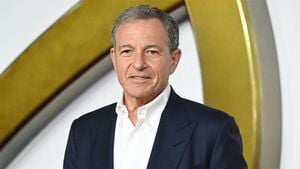Donald Trump is assembling his national security team, and the early appointments paint a picture of hawkishness rather than the anticipated peace. Trump recently named Pete Hegseth, the long-time Fox News commentator and Army National Guard veteran, as his choice for Secretary of Defense. This announcement rounds out what some are calling Trump’s war cabinet.
Throughout his career, Hegseth has not shied away from controversial stances. He has publicly criticized diversity and inclusion initiatives as detrimental to the military, claiming they have weakened the forces. Trump positioned Hegseth as "a courageous and patriotic champion of our 'Peace Through Strength' policy," tying his foreign policy approach closely to military might.
Hegseth, who graduated from Princeton University and has served multiple tours, including one at Guantanamo Bay, echoed views aligned with aggressive military strategies. He has advocated for rethinking the rules of engagement, referencing U.S. laws against war crimes as obstacles to military success. Past calls to bomb Iranian economic targets and other military provocations suggest his tenure could prioritize offense over traditional defense.
Joining Hegseth are prominent figures from the Republican Party, including Mike Waltz and Elise Stefanik, whose appointments as National Security Advisor and U.N. Ambassador respectively push the party’s traditional hawkish stance on foreign policy. South Dakota Governor Kristi Noem will take on the role of Secretary of Homeland Security, and John Ratcliffe, the former U.S. Representative and Trump loyalist, has been appointed to lead the CIA.
All these choices indicate Trump's pivot toward established neoconservative hardliners. Waltz and Rubio have voiced strong positions against Chinese influence, with Waltz pushing for confrontational postures across foreign threats. Conversely, Florida Senator Marco Rubio, likely to be named as Secretary of State, has called for negotiations with Russia over Ukraine, insisting victory for Ukraine is off the table.
This shift toward hawkish advisors runs counter to Trump's campaign rhetoric, where he positioned himself as the “candidate of peace.” His public statements often hinted at distancing from military entanglements, especially during the election campaign when he promised to broker peace agreements for conflicts like the one in Gaza and insisted there were no wars during his previous presidency.
Yet, just days after claiming those promises, Trump’s selected cabinet predominantly features war hawks. Political analysts note this reflects Trump's play to satisfy both sides of his party - those who lean toward interventionist foreign policy and those leaning toward isolationism.
Insiders had pushed Trump to avoid the likes of former Secretary of State Mike Pompeo, known for aggressive foreign policy but those hopes faded as hawkish candidates surfaced. The decision to nominate those more aligned with military action sparks worries among elements within the GOP advocating for less involvement overseas and reduced military expenditure.
Critics are already weighing the appointments, voicing concerns about strengthening U.S. connections with Israeli policies. For example, Trump has faced backlash for nominating future figures, like the devoutly pro-Israel former Arkansas Governor Mike Huckabee for Ambassador to Israel. Huckabee’s history of supporting controversial Israeli policies raises alarms about the direction of U.S. foreign policy.
Many of these figures bear resemblance to the hawks who populated the Trump administration before. The idea of ruling out figures like Pompeo doesn’t necessarily mean Trump will steer clear of militaristic policies, echoing sentiments from experts like Triti Parsi, who expressed skepticism about the militaristic tendencies of the current nominees.
Across the board, these appointments signal to analysts anticipating shifts toward softer policies toward international issues have not materialized. Proponents of military action hold key positions, leading many to speculate whether Trump's foreign policy will reflect his past musings about military solutions or if he will drift toward some of his campaign promises for reducing military commitments.
This is not just about appointing individuals but also about the broader policy direction it indicates. The selection of Hegseth, Waltz, Stefanik, and others aligns tightly with traditional Republican foreign policy, emphasizing military readiness and intervention rather than diplomacy and compromise. The blend of hawkishness and Trump's unique brand of populism creates uncertainty about the future of U.S. national security interests.
While some may hold out hope for Trump’s more isolationist views taking center stage—given his statements and campaign promises—the reality on the ground suggests otherwise. Their appointments suggest he is preparing for confrontations abroad rather than seeking paths of peace.
These selections are drawing mixed reactions both within political circles and among the public, highlighting the stark contrasts between the newly assembled team and Trump’s earlier assertions as the candidate for peace. It raises questions about consistency and whether Trump's policy approaches will prioritize military action or adhere to the diplomatic resolutions he promised.
The choice of individuals with strong military ties and aggressive foreign policy records genuinely reflects the traditional Republican approach to national security, as evidenced by those Trump has chosen to surround himself with. Political analysts will closely watch how these appointments translate to actual policies once they take office.
The mix of Trump’s cited desire for peace with the stark reality of his cabinet's hawkish tendencies poses challenges moving forward. This upcoming administration is illustrated clearly with its unmistakable leanings away from diplomacy and toward military might, setting the stage for how national security will be handled as we advance toward greater global conflicts.
Trump's national security team choices not only signal who they are supporting—a return to hawkish policies—but also encapsulate the complicated, often contradictory nature of his positioning as both the ‘peace president’ on the campaign trail and the ‘military readiness advocate’ as he moves forward with these appointments.



